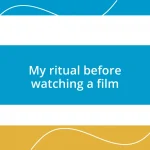Key takeaways:
- Personal film preferences are deeply influenced by individual experiences, cultural backgrounds, and emotional connections to themes and storytelling.
- Exploring different foreign film genres enriches understanding of diverse cultures and societal issues, exemplified by experiences with Italian neorealism and Korean thrillers.
- Engaging with film communities and utilizing recommendation platforms enhances the viewing experience through shared insights, discussions, and curated suggestions.
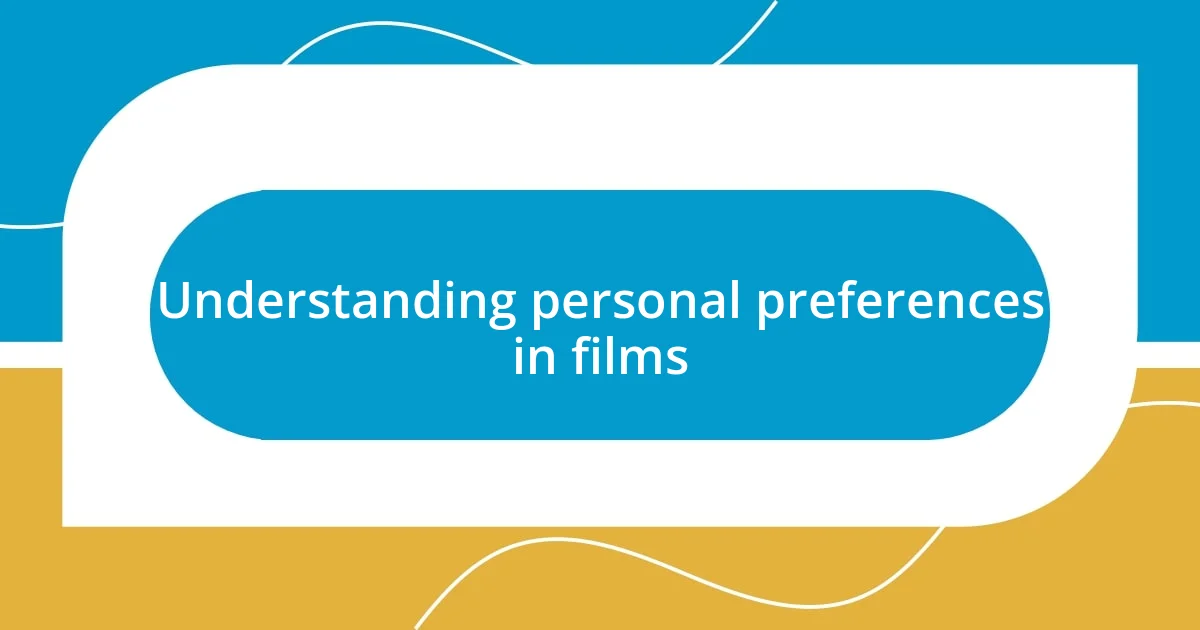
Understanding personal preferences in films
Understanding personal preferences in films can be quite a journey. For me, discovering what truly resonates involves reflecting on the themes and styles that speak to my heart. Have you ever noticed how certain films can evoke a sense of nostalgia, reminding you of personal experiences or the mood you’re in at that moment?
I remember watching a French romance film that transported me back to a summer in Paris. The bittersweet storytelling mirrored my own experiences, reawakening emotions I thought were long buried. It’s fascinating how our life experiences color our preferences; sometimes, I find myself drawn to films with complex characters who struggle and grow, as they remind me of the challenges I’ve faced.
Have you considered how cultural backgrounds affect our film choices? Growing up in a multi-cultural household, I discovered an appreciation for storytelling that spans across languages and borders. Each foreign film offers a unique lens into different lives, and I often find myself watching films as a way to learn about and connect with other cultures. This exploration deepens my understanding of humanity, which I believe fuels my passion for choosing and recommending diverse cinema.

Exploring foreign film genres
Exploring foreign film genres has opened up a vibrant world of storytelling for me. Each genre captures unique cultural nuances and themes, enabling me to experience life through the eyes of others. For instance, the thrill of a Korean thriller not only keeps me on the edge of my seat but also immerses me in intersections of morality and societal critique that I rarely encounter in mainstream cinema.
I’ve also found immense joy in delving into Italian neorealism. These films, often showcasing the stark realities of post-war Italy, evoke a deep emotional response within me. I recall watching “Bicycle Thieves” for the first time and feeling a wave of empathy wash over me as the protagonist navigated his desperate situation. The rawness in these films brings a profound sense of connection, making me reflect on humanity’s collective struggles.
When exploring genres, I sometimes compare elements that are common across cultures, like humor in French comedies compared to British ones. While both can be hilarious, they often reflect different societal attitudes and cultural references. It’s this rich tapestry of genres that piques my curiosity and enhances my viewing experience.
| Genre | Notable Country |
|---|---|
| Korean Thrillers | Korea |
| Italian Neorealism | Italy |
| French Comedies | France |
| British Comedies | UK |
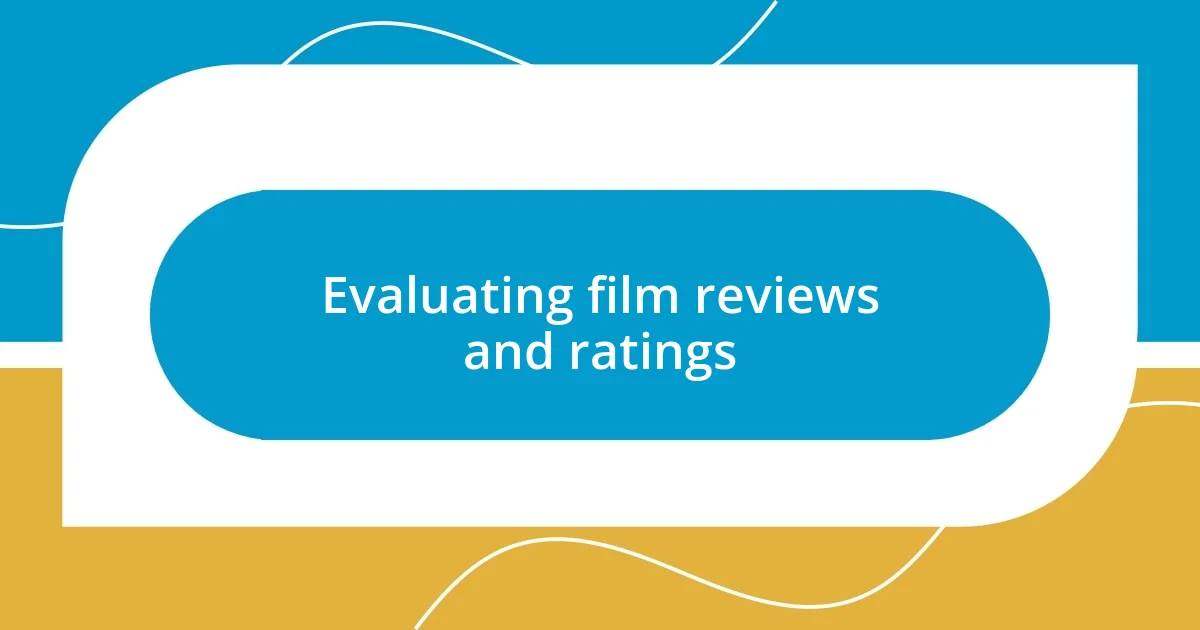
Evaluating film reviews and ratings
Evaluating film reviews and ratings can often feel like a complex puzzle. I usually find myself diving into the details, exploring the critics’ words carefully to understand their perspective. Sometimes, a review stands out due to its passionate critique or unique observations, making me think, “Wow, they really saw something that I missed.” However, I always remind myself that reviews are subjective—it’s crucial to filter this information through my personal tastes and experiences.
Here are some pointers I use when evaluating reviews and ratings:
- Check multiple sources: I like to read different reviews to get a well-rounded view of the film.
- Look for specific insights: I appreciate reviews that mention the cinematography, acting, and plot intricacies rather than just whether they liked it or not.
- Consider the reviewer’s background: Knowing a critic’s cultural background or what they typically enjoy helps me gauge their perspective.
- Trust user ratings: While user ratings can vary, they often reflect broader audience feelings and resonate more with my taste.
Another aspect I consider is the context of ratings. I find that a film rated poorly might still resonate with me personally. For instance, I once watched a Spanish film that received mediocre reviews because its pacing was too slow for many viewers. However, I found beauty in its contemplative moments, revealing profound themes about love and loss. This makes me realize that numbers don’t always tell the complete story; they can’t capture the emotional nuances that a viewer like me might appreciate.
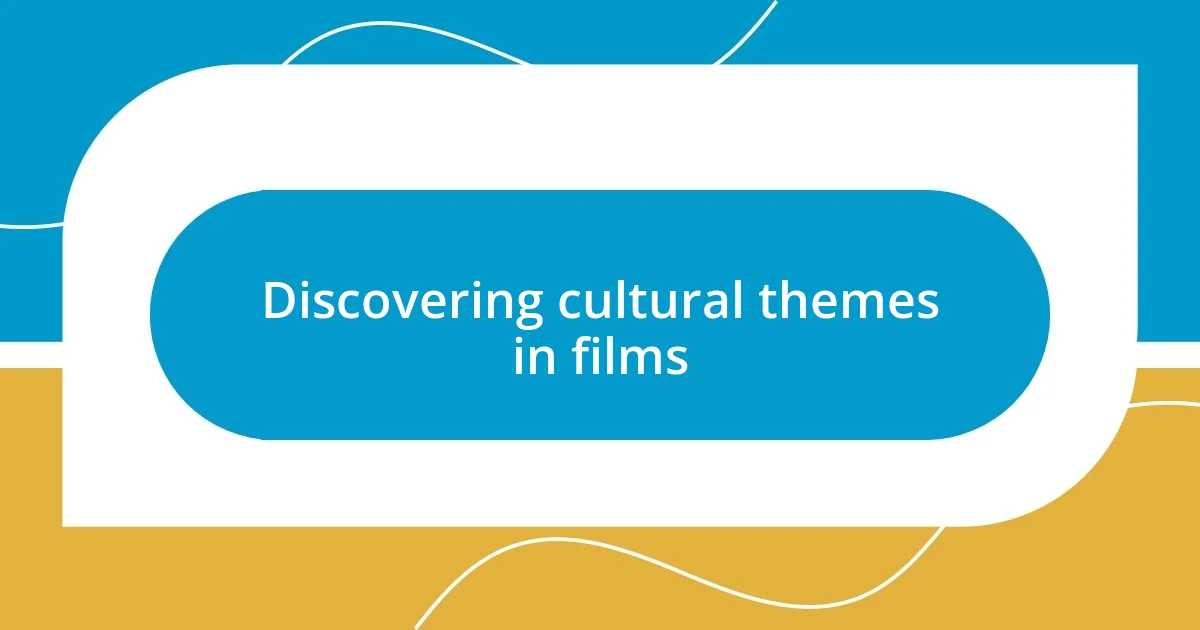
Discovering cultural themes in films
Discovering cultural themes in foreign films is like embarking on a journey into the heart of different societies. For instance, when I watched “Pan’s Labyrinth,” I was drawn into the dark and complex themes of war and innocence. The juxtaposition of a fantasy world against the backdrop of the Spanish Civil War left me pondering how folklore can serve both as an escape and a reflection of societal trauma.
I often find that certain films resonate with me on a visceral level because they address universal concepts through a cultural lens. Take the Japanese film “Spirited Away,” for instance. It offers a beautiful exploration of identity and growth, wrapped in rich cultural symbolism that left me reflecting on my own experiences of transition and change. How incredible is it that a film can evoke such personal reflections while teaching me about Shinto beliefs and the importance of balance within nature?
These cultural themes are often revealed in subtle ways, like the way a character’s actions reflect collective values or societal issues. I remember feeling a deep connection while watching “The Lunchbox,” which highlights the intricacies of love and loneliness in modern India. It made me appreciate the simple act of sharing food, transforming a mundane experience into a poignant commentary on human connection. It’s moments like these that remind me why I love exploring foreign films; they open my eyes to the beautiful complexities of life around the globe.

Utilizing film recommendation websites
Using film recommendation websites has become a crucial part of my process in selecting foreign films. I often find myself browsing platforms like Rotten Tomatoes or IMDb, where the diverse array of ratings and user reviews acts as a treasure trove of insights. What particularly stands out to me is how these sites often allow users to filter recommendations based on specific genres, moods, or even themes. Have you ever noticed how a good algorithm can surprise you with films you never would have considered? It certainly has for me.
I sometimes bookmark films based on lists curated by film enthusiasts or critics. One such experience was discovering “Amélie,” which I initially missed in theaters. The glowing recommendations from users hailing its whimsical storytelling had me intrigued. I watched it on a whim one weekend, and I was utterly charmed. The film resonated with my love for quirky narratives and beautifully illustrated Paris. It’s amazing how a simple recommendation can open doors to incredibly vivid cinematic experiences.
Moreover, I appreciate when these websites provide additional context, such as film background, directors’ previous works, or related films. One time, I used a recommendation site that suggested “City of God” after I expressed my admiration for “The Motorcycle Diaries.” That connection based on thematic and stylistic similarities deepened my appreciation of both films. I often wonder—what other films are waiting for me to discover through these platforms? It just goes to show how powerful a good recommendation can be in expanding my cinematic horizons.
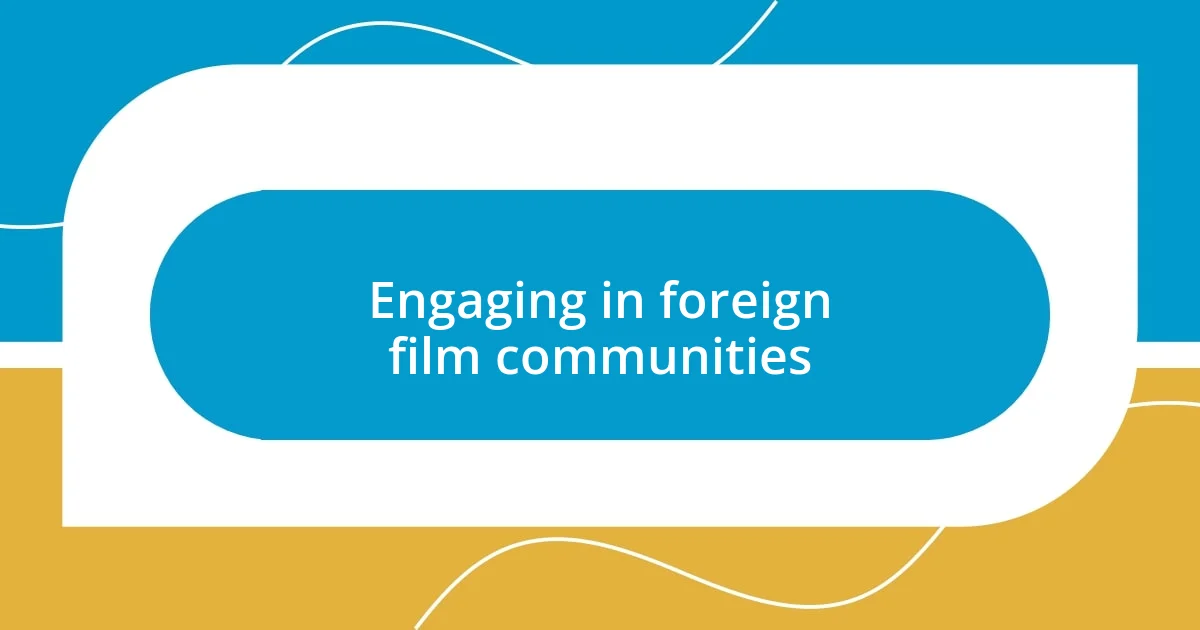
Engaging in foreign film communities
Engaging with foreign film communities has been a game changer for me. I remember the first time I joined an online forum dedicated to Italian cinema. It felt like stepping into a warm, welcoming space where everyone shared a passion for films I had yet to explore. Those conversations opened my eyes to hidden gems like “La Vita è Bella.” The way other members dissected scenes and emotions inspired me to watch with a more analytical lens. Isn’t it fascinating how communal discussions can deepen our understanding of a film?
In addition to forums, I’ve attended local screenings organized by film clubs. One warm summer evening, I found myself among a group watching “Parasite,” followed by an intense post-screening discussion. The energy in the room was electric as we exchanged interpretations and impressions. I felt a real sense of camaraderie as we debated the social satire intertwined with dark humor. It’s moments like these that reinforce my belief in the power of collective viewing experiences. Have you ever felt that surge of excitement talking about a movie with others?
Social media has also become an invaluable tool for connecting with fellow film enthusiasts. I often find myself scrolling through hashtags related to foreign films, stumbling upon critiques and enthusiastic recommendations. Just last month, I engaged with a Twitter thread discussing South Korean thrillers, which led me to watch “Oldboy.” The lively discussions and varied perspectives made me appreciate the film’s complex narrative all the more. How remarkable is it to realize that in this digital age, we can form bonds through shared cinematic experiences, regardless of where we are in the world? Engaging in these communities has truly transformed my approach to foreign films.

Making informed viewing decisions
Making informed viewing decisions requires a keen eye for detail and an understanding of what resonates with me. I often start by checking critics’ reviews but also pay attention to audience feedback. One time, I decided to watch “The Intouchables” after noticing how both critics and viewers expressed their love for the film’s heartwarming story. It’s interesting how this balance helps me navigate the sometimes overwhelming selection of foreign films.
I’ve developed a habit of reading synopses and exploring trailers before diving into a new film. For instance, I vividly recall stumbling upon “Pan’s Labyrinth” while looking for something visually captivating. The trailer was so hauntingly beautiful that I just knew I had to experience its world. Don’t you think that a well-crafted trailer can really whet your appetite for a film? That moment of satisfaction when you discover that the film lives up to those tantalizing snippets is truly rewarding.
Sometimes, I also look for films with similar thematic elements to those I’ve loved in the past. This approach has led me to unexpected yet delightful finds, like pairing my admiration for “Crouching Tiger, Hidden Dragon” with “The Assassin.” Both films’ intricate storytelling and stunning visuals provided me with profound emotional experiences. Have you ever considered how your past favorites can guide your future viewing choices? It’s a strategy that not only saves time but enhances my overall cinematic journey.










